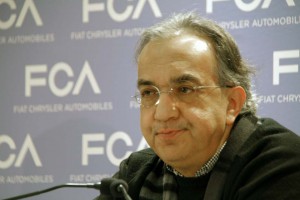
The numbers may not be as good as they first appear, leaving much work ahead for FCA CEO Sergio Marchionne and his team.
In a major turnaround, FCA US – the former Chrysler – turned a $2.6 billion profit for the first three months of this year, compared with a $690 million loss during the first quarter of 2014.
But the American side of trans-Atlantic automaker Fiat Chrysler may not have much reason to celebrate, the vast bulk of its earnings coming from tax benefits as it changed its tax status when Chrysler became a wholly owned subsidiary.
There were, nonetheless, some positive signs for the company which saw vehicle shipments jump 8%, to 718,000 cars, trucks and crossovers. That was largely due to strong demand for the new Jeep Cherokee and Renegade models, as well as the redesigned Chrysler 200.
In turn, revenues jumped by 10%, to $20.9 billion.
The maker reported another increase in demand in April, marking its 61st consecutive monthly sales gain. But despite that ongoing upturn, it has struggled to boost meager 3.7% profit margins.
Indeed without the tax benefits it accrued for the latest quarter, FCA US would have earned a profit of just $312 million. And removing one-time charges from the first-quarter 2014 numbers, the former Chrysler would have reported a profit of $486 million.
Detroit makers, in general, have been lagging some of their overseas rivals. Ford, for example, reported $1.3 billion in pre-tax North American profits for the first quarter, GM earnings $2.2 billion. Both makers saw overall earnings decline during the January-March period.
By comparison, Toyota today reported $3.73 billion in earnings for the three-month timeframe, the final quarter in its fiscal year. Both Daimler AG and Volkswagen AG also reported strong quarterly earnings.
(FCA offering free college to dealership employees. For more, Click Here.)
Richard Palmer, FCA’s chief financial officer, said the maker is working to better balance production, and aiming to trim costly incentives.
The goal is to boost profit margins to 7% by the final quarter of the year.
(Click Here for a spy shot of the 2016 Chrysler Town & Country minivan.)
Several other factors could help, including the rollout of the new Renegade, Jeep’s smallest product line. FCA US also is preparing to switch over to an all-new minivan line out of its big assembly plant in Windsor, Ontario.
But FCA CEO Sergio Marchionne has contributed to concerns about the company’s long-term prospects. He has repeatedly raised the issue of runaway costs in an industry dealing with a variety of challenges – including the need to deal with strict global emissions and fuel economy standards – and has said that FCA would like to find an additional partner to help improve economies of scale.
(To see more about Marchionne’s push for industry consolidation, Click Here.)
So far, no potential partner has come forward, though GM CEO Mary Barra has ruled out a tie-up with FCA.

That picture says a lot about Marchionne’s feelings toward Chrysler.